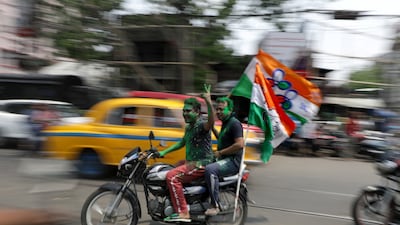In a results-oriented business like electoral politics, there is rarely such a thing as a moral victory. But that is precisely what India’s opposition parties achieved on Tuesday even though they are, numerically speaking, unlikely to win the general election.
By evening, it appeared that the governing Bharatiya Janata Party would end up with the highest number of seats in the lower house of Parliament. The National Democratic Alliance of which it is a part was leading in more than half the number of seats.
And yet if one were to gauge the mood on the ground from afar – including by trawling through mainstream and social media channels and talking to people from different walks of life – it would be easy to think that the party that’s been in power for a decade just got crushed by its opponents.
That’s because the BJP's victory was more sweeping in the 2014 and 2019 general elections, when it clinched 282 and 303 seats and didn’t require support from other parties to form government. But now, in a situation where it needs help from its partners in the NDA, the ball is not entirely in its court.
That in and of itself is a win for the opposition INDIA alliance that has suffered defeat after electoral defeat over the past 10 years, both at the national and local levels.
Hectic parleying had already begun before the tallying finished, as the opposition camp reportedly reached out to some of the smaller NDA parties to jump ship. But regardless of who forms government in the coming days – and the BJP might still be able to hold its flock together – what is crystal clear is that something has shifted in Indian politics: it is almost certain to regress towards the mean.
Since 2014, on the back of brute majorities in Parliament, the administration led by Prime Minister Narendra Modi has dominated national politics. Opposition parties – primarily the Indian National Congress that previously held power for more than five decades – had been beaten into submission, reduced to double-digit numbers of MPs in the lower house. The BJP rode the “Modi wave” to win elections in a majority of the states and urban centres, albeit with notable setbacks.
During this period, the government targeted the opposition by sending investigative agencies after its leaders, purportedly to tackle corruption, although critics allege that the real reason was to co-opt these politicians and their vote banks.
It also rammed through a number of reforms, including the abrogation of Article 370 that gave autonomy to the disputed territory of Jammu-Kashmir and stopping the practice of “triple talaq” that empowered Muslim men to unilaterally end their marriage.
Whenever the government faced a public backlash, such as during the passage of three contentious farm laws and a citizen amendment act, it did the prudent thing and withdrew these reforms. But opposition parties and civil society continued to paint the deeply ideological Hindu nationalist party as a force determined to eventually amend the Constitution to convert the republic from a liberal, secular democracy to an illiberal, Hindu ethnocracy.
Clearly, this narrative was not compelling enough for millions of Indians who were, quite understandably, more focused on the government’s economic programmes, infrastructure projects and muscular foreign policy that undoubtedly benefited the country. Until the long-drawn-out general election got under way in May, therefore, it was a given that the BJP would retain power, perhaps with an even bigger mandate.
But two factors may have come into play, for the election to throw what is effectively a hung verdict.
One is the economy. India’s gross domestic product growth has been impressive since the Covid-19 pandemic, and the Modi government has tamed inflation. But while global media focused on the positives – particularly at a time when multinational companies were adopting the “China plus one” strategy of investing in a country other than the world's second-largest economy – they largely ignored issues like rural distress and youth unemployment.
Experts have often talked about the silent voter, who would opt to make his or her dissent known at the ballot box rather than at protest rallies. Given how well the opposition has fared in this election among those living in rural areas and small towns, the silent voter has ultimately prevailed – no matter what the opinion polls, including the exit polls released on Saturday, told us.
The second factor may have been an acute fear, whether rational or not, among the marginalised sections of society that the BJP would mount an assault on the very idea of affirmative action as part of its agenda to amend the Constitution. This, many openly feared, would include rolling back reservations that guarantee government jobs, college admissions and welfare schemes to people from the lower caste groups. The INDIA alliance preyed, with success it seems, on this widespread anxiety during the election.
All this means that the BJP, while still a force to reckon with, will be a diminished one.
It’s important to note that over the past decade, Mr Modi’s popularity was such that a cult of personality had emerged that subsumed most of the faultlines and contradictions that have been a feature of Indian politics. Such was his command that politicians, policymakers and bureaucrats marched to a sometimes-overcentralised government’s tune. The BJP, critics often claimed, was in the middle of pursuing its own One Nation project that included a deliberate subordination of the states to the federal government. This could change.
Second, one presumes that with more representatives in Parliament, the opposition will be much stronger for the next five years. This is vital. The hope for millions of Indians must be that the new political equations translate to more robust debates and discussions in the highest legislature of the land and greater co-operation among parties and governments at all levels.
This would amount to more than just a moral victory for the people of India.








